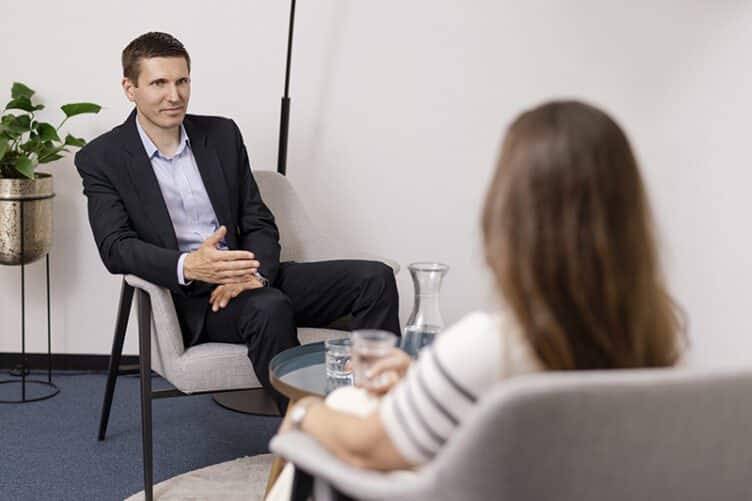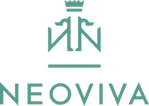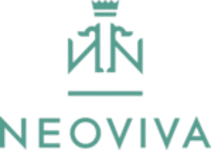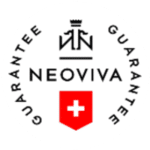Drug addiction treatment in Switzerland
Utilising advanced, evidence-based techniques, our intensive drug addiction treatment addresses both the physical and psychological aspects of substance use disorder. From monitored detoxification to therapeutic interventions and continuous support, we provide luxury care aimed at helping you conquer addiction and secure long-term recovery.

Personalised care in a real-world environment for best results
NEOVIVA excels in drug addiction treatment through its innovative methods and unwavering support. By hosting our programme in a hotel, we offer a realistic environment that prepares you for daily challenges after rehab. This distinctive setting ensures a smoother transition back home, significantly lowering relapse risks by immersing you in everyday scenarios under the vigilant care of our medical and clinical team.
Central to our method, our recovery counsellors, each having overcome addiction and being clean for over a decade, provide invaluable insights and compassionate support. They enhance your recovery journey with relatable experiences and shared triumphs.
Recognising that recovery continues beyond your stay at our private facility, our extensive aftercare programme is designed to sustain your progress and promote long-term sobriety..
Arrange a consultation
Schedule a free consultation today and take the first step towards recovery with NEOVIVA.

Why choose NEOVIVA for help with drug-related problems?

The extensive benefits of private drug addiction treatment pave the way for a healthier, more satisfying life. NEOVIVA’s distinctive approach blends scientific methods with compassionate care, providing significant advantages that enhance your recovery journey:
- Tailored treatment plans – At NEOVIVA, every plan is customised to meet your individual needs, ensuring focused and effective care.
- Science-backed practices & innovative therapies – We employ the latest evidence-based practices and innovative therapies like rTMS to support sustained recovery.
- Relapse prevention – Recognising the chronic nature of drug addiction, we equip you with strategies and tools to manage triggers and develop healthy coping mechanisms.
- Healing surroundings – Our serene setting significantly enhances the recovery process, allowing you to relax and focus on your health.
- Exclusive accommodation – Our lakeview suites offer a sanctuary of comfort and privacy, featuring high-end amenities that match the elegance and sophistication of a luxury resort.
- Meaningful activities – From nature walks and mindfulness sessions to Shinrin Yoku, our activities help you connect with your environment and reflect personally.
- Comprehensive care – Our multidisciplinary team addresses all physical, mental, and emotional aspects of recovery.
Our addiction specialists
Meet the key members of staff who will help you on your journey to recovery.

Andrei Khomenko
Medical Director
As our Medical Director, Andrei faces the daily challenge to ensure the highest level of clinical care, and to establish and maintain the required quality assurance mechanisms and effective processes of clinical governance.

Mohammed Shafiullah
Clinical Psychologist
Mohammed’s journey into the world of psychology and psychotherapy is marked by a blend of purposeful academic pursuit and a deeply rooted commitment to comprehensive patient care.
NEOVIVA’s approach to drug addiction treatment
Recognising that you have a problem is the crucial first step, but transitioning from both physical and mental dependency to a healthier lifestyle is a formidable challenge, requiring meticulous attention to each stage of rehabilitation. At NEOVIVA, we outline four key stages in addiction recovery treatment:
1. Initial consultation
A thorough addiction assessment is essential in the rehabilitation process. Individuals struggling with addiction often maintain secrecy due to fears of legal repercussions and societal judgment. Building trust is crucial for an accurate assessment. Moreover, substance abuse is frequently connected to underlying mental health disorders, making it imperative to identify and address any co-occurring conditions alongside the addiction.
2. Supervised medical detox
The initial phase typically involves detoxification, carried out in one of our partner clinics. The necessity of this process will be determined during your comprehensive assessment with our medical team. This stage can be challenging as your body adapts to the absence of drugs, but our supportive medical team will provide continuous care to ensure a smooth transition.
3. Treatment
Following detox, your treatment programme at NEOVIVA will include daily group therapy, psychoeducation, individual counselling, psychotherapy, and creative expression. Our comprehensive approach also incorporates mindfulness training, educational sessions on addiction and recovery, and body-focused methods for nervous system regulation. Enhanced by a comprehensive medical and physical assessment, your treatment may also include advanced methods like rTMS to reduce cravings and improve mood.
4. Continuing care
We emphasise the importance of ongoing support and encourage continued progress after returning home with our extensive Continuing Care programme, which you will begin after completing your treatment at NEOVIVA.
Frequently Asked Questions
About
drugs
Can't I just quit drugs on my own?
Quitting drugs like cocaine or heroin on your own can be extremely challenging and dangerous due to strong cravings and severe withdrawal symptoms, which can sometimes be life-threatening. Professional treatment provides medical supervision to manage these risks and reduce the chance of relapse.
Evidence-based programmes and therapy significantly improve the chances of successful, long-term recovery. Seeking professional help is crucial for your safety and well-being.
Can drug addiction lead to other mental health problems?
Yes, drug addiction can indeed lead to other mental health disorders. It is common for individuals struggling with addiction to also experience mental illnesses, though it is often challenging to determine if addiction causes these conditions or if they turn to substance use as a form of self-medication.
Both addiction and mental health disorders may share common genetic and neurological underpinnings. For instance, research indicates that marijuana use can induce psychotic symptoms akin to those seen in schizophrenia. Therefore, comprehensive treatment that addresses both addiction and co-occurring mental health issues is essential for effective and holistic recovery.
Is there a cure for drug addiction?
There isn’t a “cure” for substance use disorders in the way some other diseases are treated. Instead, the “cure” is a lifelong journey of recovery. If you have managed to stop using drugs you will have done so through active engagement in a recovery plan. Although you no longer consume drugs or alcohol, you remain vulnerable to relapse and must make significant lifestyle changes to support your new way of life.
Thus, most people with substance use disorders do not consider themselves “cured” but rather identify as “no longer active” in their substance use.
About
treatment
How long does drug treatment take?
The duration of drug addiction treatment varies based on individual needs and circumstances. While a typical stay of around 28 days is recommended for effective change, treatment often extends beyond this period.
Our programmes incorporate peer counselling, support group meetings, and aftercare for at least six months. Long-term recovery is a continuous process, with some clients attending meetings or refresher weeks for years. The specific length of time in rehab depends on factors like the severity of addiction and personal progress. Consulting with professionals will help determine the appropriate duration for your situation.
How does a typical treatment day at NEOVIVA look like?
From breakfast until bedtime, clients at NEOVIVA engage in activities focused on their rehabilitation goals. Group and one-on-one therapy sessions are divided into morning and afternoon blocks. These are complemented by meaningful recreational and leisure activities, providing opportunities to reinforce new skills and strategies.
While our clinical and medical team provides continuous support throughout the day, time is also allocated for personal interests, rest, relaxation, and, if you wish, visits with family and friends. In short, treatment at NEOVIVA is an active process, balancing physical and mental demands with periods of rest.
Can I participate in drug addiction treatment as an outpatient?
At NEOVIVA, we do not offer drug addiction treatment on an outpatient basis. We believe that a residential setting is crucial for effectively addressing substance use disorder. This immersive environment provides constant supervision and support, significantly reducing the risk of relapse.
Our intensive inpatient programmes offer a structured routine and immediate access to a wide range of therapeutic interventions, ensuring that all aspects of your addiction and underlying issues are thoroughly addressed. This high level of bespoke care is essential for achieving long-term recovery and preventing relapse.


